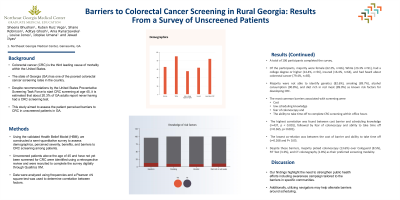Tuesday Poster Session
Category: Colorectal Cancer Prevention
P3813 - Barriers to Colorectal Cancer Screening in Rural Georgia: Results From a Survey of Unscreened Patients
Tuesday, October 29, 2024
10:30 AM - 4:00 PM ET
Location: Exhibit Hall E

Has Audio
- SB
Sheena Bhushan, MD
Northeast Georgia Medical Center
Buford, GA
Presenting Author(s)
Sheena Bhushan, MD1, Ruben Ruiz Vega, MD2, Shane Robinson, MS3, Aditya Ghosh, MD3, Ania Rynarzewska, PhD2, Louise Jones, PhD3, Idopise Umana, MD2, Jawad Ilyas, MD4
1Northeast Georgia Medical Center, Buford, GA; 2Northeast Georgia Medical Center, Atlanta, GA; 3Northeast Georgia Medical Center, Gainesville, GA; 4Atlanta Gastroenterology Associates, Atlanta, GA
Introduction: Colorectal cancer (CRC) is the third leading cause of mortality within the United States. The state of Georgia (GA) has one of the poorest colorectal cancer screening rates in the country. Despite recommendations by the United States Preventative Screening Task Force to start CRC screening at age 45, it is estimated that about 20.3% of GA adults report never having had a CRC screening test. This study aimed to assess the patient perceived barriers to CRC in unscreened patients in GA.
Methods: Using the validated Health Belief Model (HBM), we constructed a semi-quantitative survey to assess demographics, perceived severity, benefits, and barriers to CRC screening among patients. Unscreened patients above the age of 45 and have not yet been screened for CRC were identified using a retrospective review and were recruited to complete the survey digitally through Qualtrics XM. Data were analyzed using frequencies and a Pearson chi square test was used to determine correlation between factors.
Results: A total of 106 participants completed the survey.. Of the participants, majority were female (62.2%, n=66), White (23.3% n=91), had a college degree or higher (14.4%, n=56), insured (16.4%, n=64), and had heard about colorectal cancer (79.4%, n=85). Majority were not able to identify genetics (82.6%), smoking (89.7%), alcohol consumption (90.8%), and diet rich in red meat (89.0%) as known risk factors for developing CRC. The most common barriers associated with screening were cost, low scheduling knowledge, fear of colonoscopy, and ability to take time off to complete CRC screening within office hours. The highest correlation was found between cost barrier and scheduling knowledge (r=437, p < 0.001), followed by fear of colonoscopy and ability to take time off (r=0.365, p< 0.001). The lowest co-relation was between the cost of barrier and ability to take time off (r=0.268 and P< 0.05. Despite these barriers, majority picked colonoscopy (13.6%) over Cologuard (8.5%), FIT Test (3.3%), and CT colonography (1.8%) as their preferred screening modality.
Discussion: Our findings highlight the need to strengthen public health efforts including awareness campaign tailored to the barriers in specific communities. Additionally, utilizing navigators may help alleviate barriers around scheduling.
Disclosures:
Sheena Bhushan, MD1, Ruben Ruiz Vega, MD2, Shane Robinson, MS3, Aditya Ghosh, MD3, Ania Rynarzewska, PhD2, Louise Jones, PhD3, Idopise Umana, MD2, Jawad Ilyas, MD4. P3813 - Barriers to Colorectal Cancer Screening in Rural Georgia: Results From a Survey of Unscreened Patients, ACG 2024 Annual Scientific Meeting Abstracts. Philadelphia, PA: American College of Gastroenterology.
1Northeast Georgia Medical Center, Buford, GA; 2Northeast Georgia Medical Center, Atlanta, GA; 3Northeast Georgia Medical Center, Gainesville, GA; 4Atlanta Gastroenterology Associates, Atlanta, GA
Introduction: Colorectal cancer (CRC) is the third leading cause of mortality within the United States. The state of Georgia (GA) has one of the poorest colorectal cancer screening rates in the country. Despite recommendations by the United States Preventative Screening Task Force to start CRC screening at age 45, it is estimated that about 20.3% of GA adults report never having had a CRC screening test. This study aimed to assess the patient perceived barriers to CRC in unscreened patients in GA.
Methods: Using the validated Health Belief Model (HBM), we constructed a semi-quantitative survey to assess demographics, perceived severity, benefits, and barriers to CRC screening among patients. Unscreened patients above the age of 45 and have not yet been screened for CRC were identified using a retrospective review and were recruited to complete the survey digitally through Qualtrics XM. Data were analyzed using frequencies and a Pearson chi square test was used to determine correlation between factors.
Results: A total of 106 participants completed the survey.. Of the participants, majority were female (62.2%, n=66), White (23.3% n=91), had a college degree or higher (14.4%, n=56), insured (16.4%, n=64), and had heard about colorectal cancer (79.4%, n=85). Majority were not able to identify genetics (82.6%), smoking (89.7%), alcohol consumption (90.8%), and diet rich in red meat (89.0%) as known risk factors for developing CRC. The most common barriers associated with screening were cost, low scheduling knowledge, fear of colonoscopy, and ability to take time off to complete CRC screening within office hours. The highest correlation was found between cost barrier and scheduling knowledge (r=437, p < 0.001), followed by fear of colonoscopy and ability to take time off (r=0.365, p< 0.001). The lowest co-relation was between the cost of barrier and ability to take time off (r=0.268 and P< 0.05. Despite these barriers, majority picked colonoscopy (13.6%) over Cologuard (8.5%), FIT Test (3.3%), and CT colonography (1.8%) as their preferred screening modality.
Discussion: Our findings highlight the need to strengthen public health efforts including awareness campaign tailored to the barriers in specific communities. Additionally, utilizing navigators may help alleviate barriers around scheduling.
Disclosures:
Sheena Bhushan indicated no relevant financial relationships.
Ruben Ruiz Vega indicated no relevant financial relationships.
Shane Robinson indicated no relevant financial relationships.
Aditya Ghosh indicated no relevant financial relationships.
Ania Rynarzewska indicated no relevant financial relationships.
Louise Jones indicated no relevant financial relationships.
Idopise Umana indicated no relevant financial relationships.
Jawad Ilyas indicated no relevant financial relationships.
Sheena Bhushan, MD1, Ruben Ruiz Vega, MD2, Shane Robinson, MS3, Aditya Ghosh, MD3, Ania Rynarzewska, PhD2, Louise Jones, PhD3, Idopise Umana, MD2, Jawad Ilyas, MD4. P3813 - Barriers to Colorectal Cancer Screening in Rural Georgia: Results From a Survey of Unscreened Patients, ACG 2024 Annual Scientific Meeting Abstracts. Philadelphia, PA: American College of Gastroenterology.
